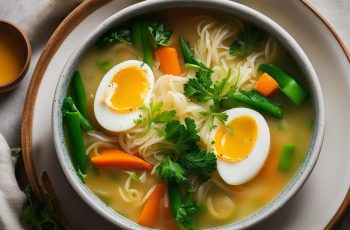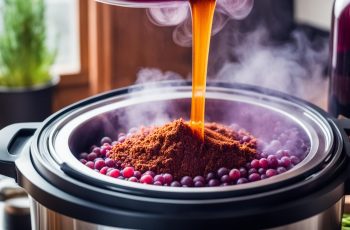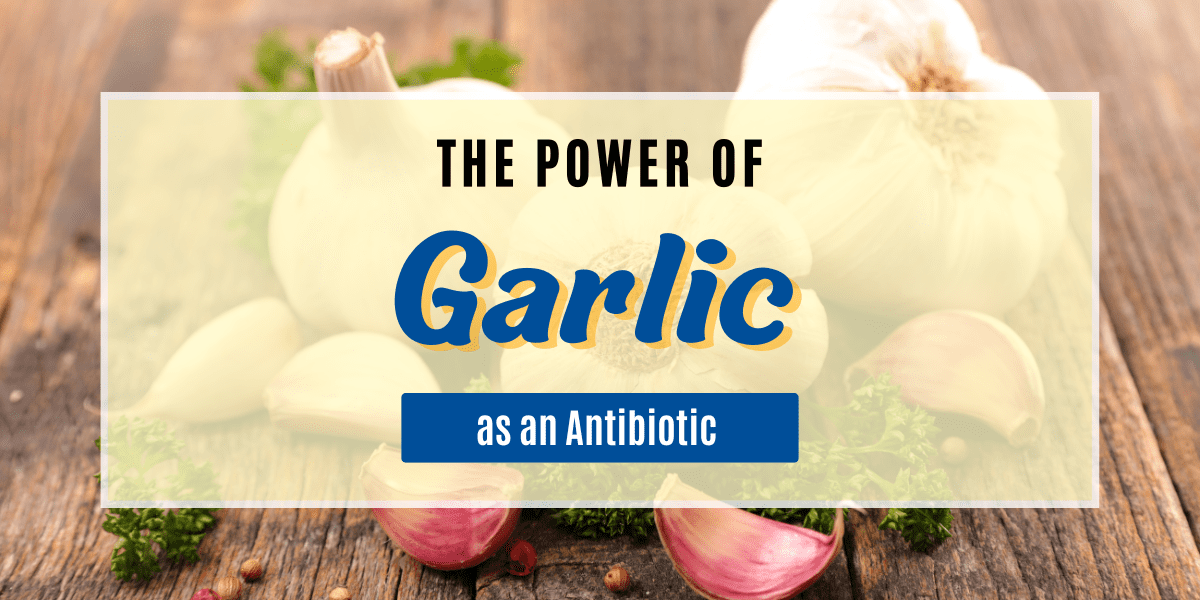
For centuries, garlic has been used as a natural remedy for a variety of ailments. It is effective in treating both viral and bacterial infections and can be used topically or ingested. But did you know that this pungent little bulb can also be used as an antibiotic?
Garlic and Antibiotics
Garlic has been used as both food and medicine since ancient times. It is a member of the onion family. The bulb of the garlic plant contains many small, edible cloves. Garlic cloves are used to make medicine.
Garlic is used for a wide range of conditions related to the heart and blood system. These conditions include high blood pressure, high cholesterol, coronary heart disease, heart attack, and atherosclerosis.
Garlic is also used for other conditions such as earache, migraine headache, arthritis, joint pain, asthma, coughs, diarrhea, and colds. It is also sometimes used for Lyme disease and leukemia. Women use garlic for menstrual cramps and other menstrual disorders.

How to Use Garlic as an Antibiotic
Garlic can be used topically or ingested to treat both bacterial and viral infections. To use garlic topically, crush a clove of garlic and apply it to the affected area. Cover with a bandage and leave for several hours before repeating. For ingestion, add crushed garlic cloves to food or juice or take in supplement form. It is important to consult a healthcare practitioner before taking supplements.
When using garlic internally, it is important to start with small doses and increase gradually as tolerated. Some people may experience gastrointestinal discomfort when taking large amounts of garlic internally. In these cases, it is best to take garlic in supplement form. Supplements are generally well-tolerated and provide a more concentrated dose of allicin than eating raw garlic cloves.
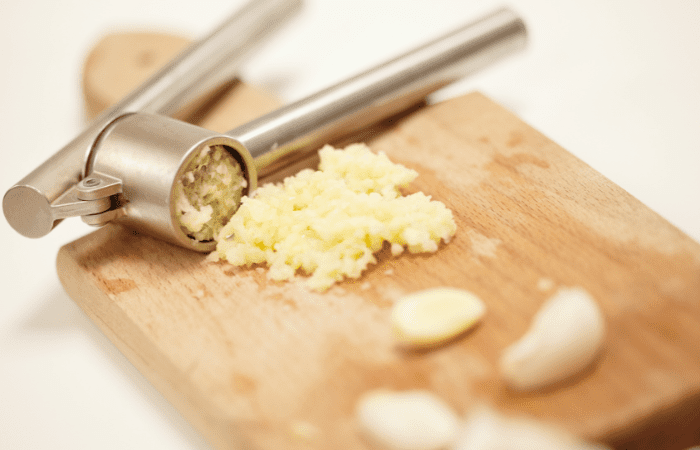
Does Garlic Absorb Bacteria?
So how does garlic kill bacteria? When garlic comes into contact with harmful bacteria, it produces a compound called allicin. Allicin is a natural antibiotic that can kill bacteria.
Allicin is most potent when the garlic is fresh. This means that if you’re looking to harness the antibacterial powers of garlic, it’s best to use fresh garlic cloves in your cooking. If you don’t have fresh garlic on hand, you can also use jarred minced garlic or garlic powder. Just keep in mind that the powder won’t be as potent as fresh cloves.

Can You Take Garlic with Antibiotics?
Many people believe that garlic has antibacterial properties and may help to fight infection. Some also think that garlic can interfere with the effectiveness of antibiotics. So, can you take garlic with antibiotics?
It turns out that there is no concrete answer to this question. While some sources say that taking garlic supplements can reduce the effectiveness of antibiotics, other sources say that there is no evidence to support this claim. So what’s a person to do?
If you’re considering taking garlic supplements while on antibiotics, I would recommend talking to your doctor first. They will be able to give you the most accurate information based on your individual circumstances.
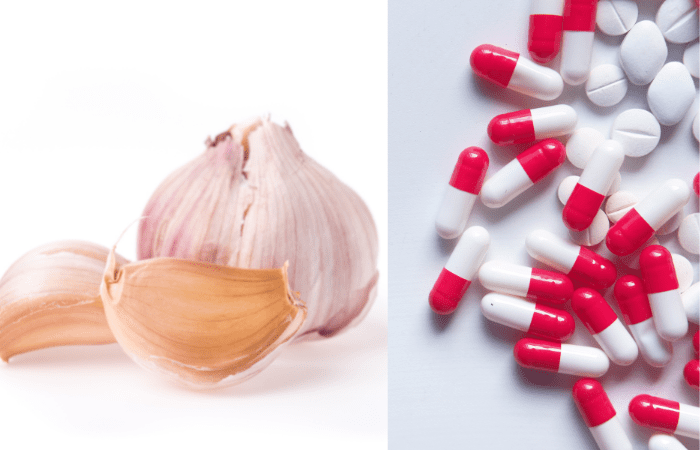
5 Foods with Antibiotic Properties
We all know that antibiotics are important for fighting off bacterial infections. But did you know that there are actually a number of everyday foods that have antibiotic properties? Here are five common foods that can help your body fight off infection.
Honey
Honey has been used as a natural remedy for centuries. It’s well-known for its ability to soothe a sore throat and calm a cough. But did you also know that honey has natural antibiotic properties? That’s right – honey can help fight off bacterial infections. Studies have shown that honey can be just as effective as some over-the-counter cough syrups at reducing cough severity and frequency. And because honey is a natural product, it has few side effects.
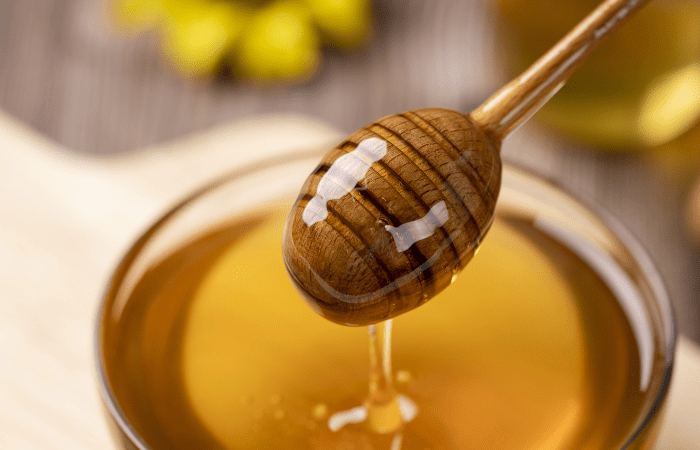
Garlic
Like honey, garlic has also been used as a natural remedy for centuries. Garlic is known for its ability to boost the immune system and fight off infection. This is thanks to a compound called allicin, which is found in garlic. Allicin has both antiviral and antibacterial properties. So next time you’re feeling under the weather, try adding some extra garlic to your meals.

Coconut Oil
Coconut oil is another food with antibiotic properties. Coconut oil contains lauric acid, which has been shown to kill bacteria, viruses, and fungi. Coconut oil can be used topically to treat skin infections or taken internally to fight off a respiratory infection. You can add coconut oil to your cooking or take it by the spoonful – either way, it’s a delicious way to fight off infection!
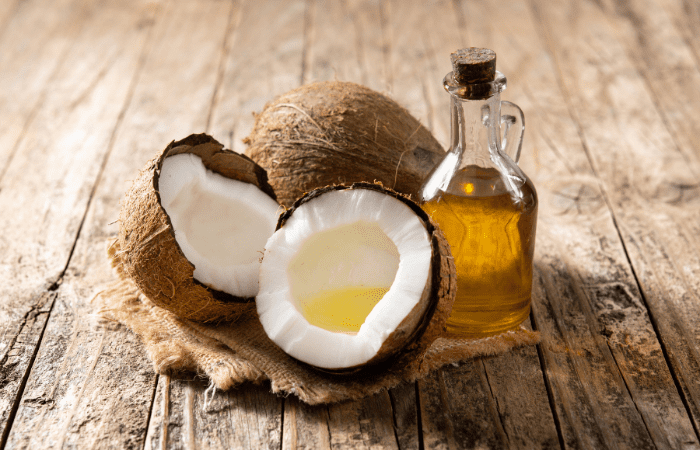
Yogurt
Yogurt contains live and active cultures, which are beneficial bacteria that can help fight off infection. These cultures can help replenish the good bacteria in your gut after you’ve taken antibiotics. They can also help prevent intestinal infections. Be sure to choose yogurt with live and active cultures for the most benefit. You can add yogurt to smoothies or eat it on its own – it’s up to you!

Green Tea
Green tea is packed with antioxidants and also has antibiotic properties. Green tea contains catechins, which are compounds that have been shown to inhibit the growth of bacteria. Green tea can be enjoyed hot or cold – either way, it’s a great way to fight off infection!
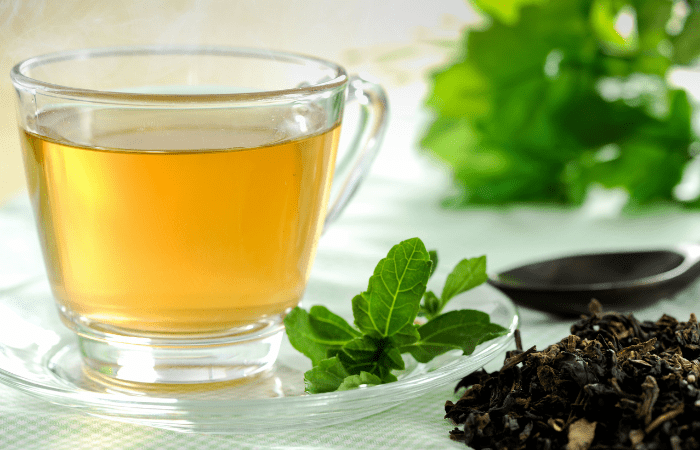
4 Foods with Antibacterial Properties
Cinnamon
Cinnamon has long been used in traditional medicine as an anti-inflammatory agent. cinnamon is also antimicrobial, making it effective in fighting off infections. Cinnamon can be added to tea, coffee, smoothies, or baked goods for an extra health boost. Or try simmering cinnamon sticks in water on the stove for a warm and fragrant beverage.
Garlic
Garlic has been used for centuries as both a food and a medicine. Allicin, the primary active compound in garlic, has potent antibacterial properties. Garlic can be used to boost the immune system, fight off infections, and even reduce the severity of colds and flus. Add garlic to soups, stews, pasta dishes, or simply roast it in the oven for a delicious and healthy side dish.
Honey
Honey is a natural antibacterial and can be used to treat a number of different ailments, both internally and externally. When taken internally, honey can help to soothe a sore throat and calm an upset stomach. When applied topically, honey can be used to treat wounds, burns, and acne. Honey is also a great addition to any cold remedy tea.
Turmeric
Turmeric is another potent antibacterial spice that has been used in traditional medicine for centuries. Curcumin, the primary active compound in turmeric, has strong anti-inflammatory effects. Turmeric can be added to soups, curries, stir-fries, or even smoothies for a nutrient-dense boost. You can also find turmeric supplements at most health food stores.
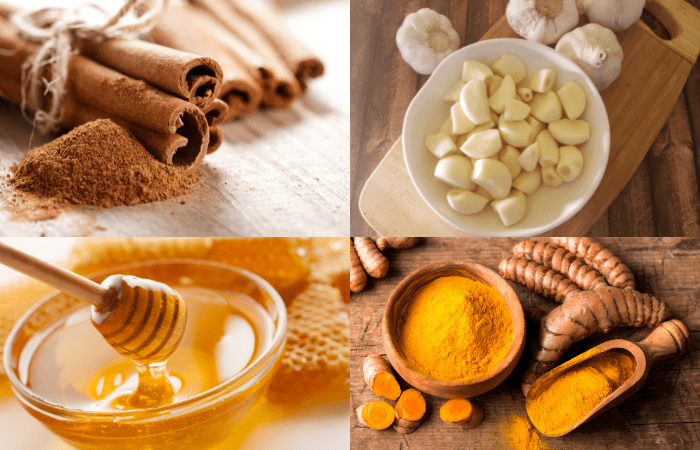
5 Antibacterial Foods and Herbs
1. Garlic
This pungent, flavor-packed herb has been used for centuries as a natural remedy for all sorts of ailments. garlic is a powerful antibacterial agent thanks to its high concentration of allicin, a sulfur compound that has been shown to kill bacteria. Allicin is released when garlic is chopped or crushed, so be sure to add it to your dishes right before you eat them.

2. Honey
Honey has been used as a medicinal remedy for centuries, and for good reason! Raw honey contains hydrogen peroxide, which gives it natural antibacterial properties. Honey is also a prebiotic, meaning it helps promote the growth of healthy gut bacteria. Add honey to your tea or coffee in the morning, or use it as a natural sweetener in baking recipes.
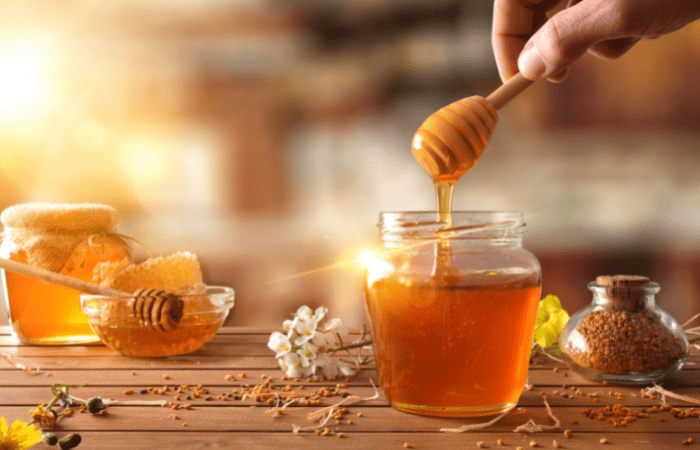
3. Turmeric
This bright yellow spice is a powerful antibacterial agent thanks to its active ingredient, curcumin. Curcumin has been shown to inhibit the growth of several types of bacteria, including Staphylococcus aureus (S. aureus) and Helicobacter pylori (H. pylori). Add turmeric to curry dishes, soups, and sautéed vegetables for a flavorful way to fight off infection.
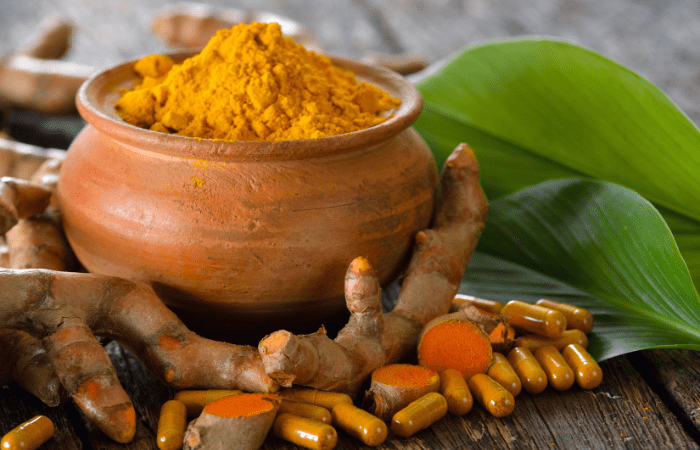
4. Green Tea
Green tea contains high levels of catechins, antioxidant compounds that have been shown to possess strong antibacterial activity against certain types of bacteria. In addition to drinking green tea, you can also use it as a household cleaner or disinfectant by boiling water and adding Tea bags or leaves let them sit for 30 mins). Be sure to label it clearly so that others know not to drink it!

5. Oregano Oil
Oregano oil is derived from the oregano plant and contains high levels of carvacrol and thymol, two compounds with potent antibacterial activity. Oregano oil can be taken orally or applied topically (diluted with olive oil) to fight off infections. You can also add a few drops to your diffuser to help purify the air in your home.
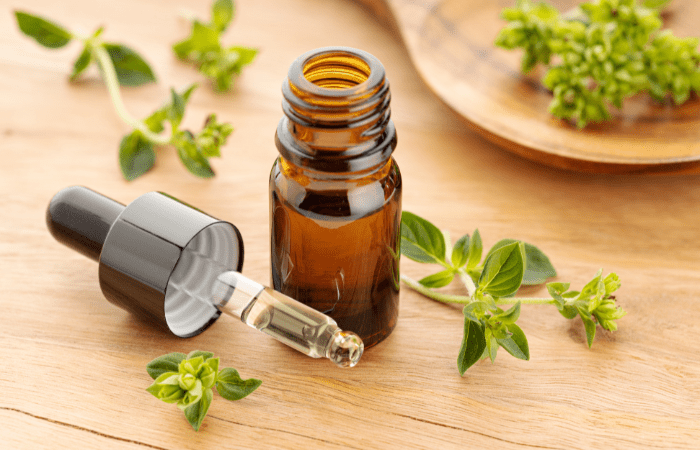
Conclusion
These are just a few of the many antibacterial foods and herbs that you can incorporate into your diet to help fight off infection. By adding these nutrient-rich foods to your meals, you’ll not only be boosting your immune system, but you’ll also be providing your body with the tools it needs to fight off bacteria. So go ahead and stock up on garlic, honey, and turmeric, and enjoy the many health benefits that these powerhouse ingredients have to offer.
Frequently Asked Questions (FAQs)
Is Garlic Stronger Than Antibiotics?
Compared to antibiotics, a garlic component is more effective at preventing food-borne disease. One of the most frequent causes of intestinal disease, the Campylobacter bacterium, is combated by a component in garlic 100 times more effectively than two well-known antibiotics.
Is Garlic the Best Natural Antibiotic?
Garlic has been shown in studies to be an effective treatment for a variety of pathogens, including Salmonella and Escherichia coli (E. coli). Even the use of garlic to treat tuberculosis that is resistant to multiple drugs has been discussed.
Can Garlic Draw Out Infection?
Many cultures have historically used garlic to treat wounds. Garlic extracts have been found in numerous animal experiments to speed up wound healing and slow down infection.
How Much Garlic Should You Take as an Antibiotic?
An appropriate dosage is up to two cloves each day. Make sure to adhere to the dosage directions if you're taking a supplement containing garlic. Before using garlic as an antibiotic, talk to your doctor if you're taking any blood-thinning medicine.



